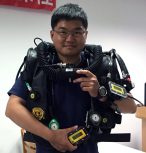DNA reveals the past and future of coral reefs
New DNA techniques are being used to understand how coral reacted to the end of the last ice age in order to better predict how they will cope with current changes to the climate. James Cook Univer

From 2005 to 2022, the main node of the ARC Centre of Excellence for Coral Reef Studies was headquartered at James Cook University in Townsville, Queensland (Australia)








Abstract: One of the major goals of ecology is to identify metrics of assemblage structure that are easy to obtain and that enable accurate predictions of how assemblages respond to disturbance and environmental change. One recent approach, termed the Universal adaptive strategy theory (UAST), has been hypothesised to apply to all creatures on the tree of life including corals. However, previous attempts to classify scleractinian corals according to UAST have been inconclusive, perhaps because they have chosen species traits according to the principles set out in the theory. In addition, the utility of the approach for predicting the response of coral assemblages to disturbance has not been effectively tested. This project aims to test whether UAST can does apply to scleractinian corals and if so, are adaptive strategy groups more effective at predicting the response of an assemblage to disturbance than approaches based on either taxonomy or morphology. I will firstly classify coral species into adaptive strategy groups using the principles of UAST and a recent comprehensive database of coral traits. Next, I will compare the utility of adaptive strategy groups and classifications based on taxonomy and colony morphology for predicting the response of coral assemblages to disturbance using several large scale or long term datasets.
Biography: Chao-yang grew up in Taipei, Taiwan. He completed his BSc in 2003 in the Department of Marine Resources at National Sun Yat-sen University (NSYSU), followed by a MSc at the Institute of Marine Biology at NSYSU and National Museum of Marine Biology and Aquarium (NMMBA). Chao-yang has worked as a research assistant for Dr. Chaolum Allen Chen (Acadamia Sinica) and Dr Joshua Madin (Macquarie University). Chao-yang started his PhD at James Cook University in March 2013. His supervisors are Prof. Andrew Baird, Prof. Morgan Pratchett and Prof. Terry Hughes. His PhD research focuses on the adaptive scleractinian corals.
New DNA techniques are being used to understand how coral reacted to the end of the last ice age in order to better predict how they will cope with current changes to the climate. James Cook Univer
A new study on the effects of climate change in five tropical countries has found fisheries are in more trouble than agriculture, and poor people are in the most danger. Distinguished Profess
James Cook University researchers have found brightly coloured fish are becoming increasingly rare as coral declines, with the phenomenon likely to get worse in the future. Christopher Hemingson, a
Researchers working with stakeholders in the Great Barrier Reef region have come up with ideas on how groups responsible for looking after the reef can operate more effectively when the next bleaching
Abstract: As marine species adapt to climate change, their heat tolerance will likely be under strong selection. Individual variation in heat tolerance and its heritability underpin the potential fo
Abstract: The Reef Ecology Lab in KAUST’s Red Sea Research Center explores many aspects of movement ecology of marine organisms, ranging from adult migrations to intergenerational larval dispersal
Abstract: Macroalgal meadows are a prominent, yet often maligned component of the tropical seascape. Our work at Ningaloo reef in WA demonstrate that canopy forming macroalgae provide habitat for ad
Abstract: Sharks are generally perceived as strong and fearsome animals. With fossils dating back at least 420 million years, sharks are not only majestic top predators but they also outlived dinosa
Abstract: Connectivity plays a vital role in many ecosystems through its effects on fundamental ecological and evolutionary processes. Its consequences for populations and metapopulations have been
Abstract: Evolution of many eukaryotic organisms is affected by interactions with microbes. Microbial symbioses can ultimately reflect host’s diet, habitat range, and even body shape. However, how
Abstract: The past few years have seen unprecedented coral bleaching and mortality on the Great Barrier Reef (GBR) but the consequences of this on biodiversity are not yet known. This talk will expl